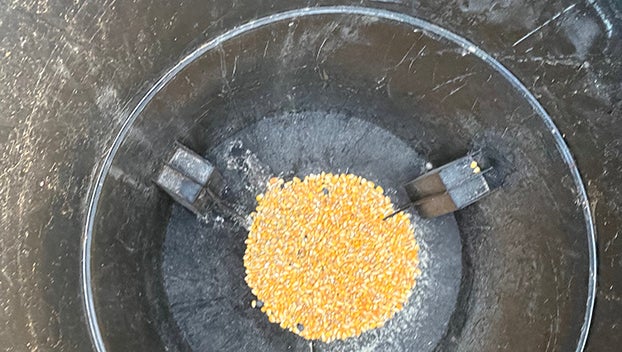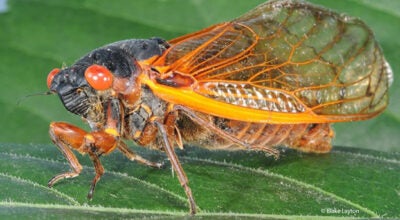MDWFP entertaining statewide feed ban discussion with disease management in mind
Published 5:00 pm Monday, February 26, 2024

- A small amount of corn left in a feeder in Lincoln County. Proper habitat management is more cost effective than filling a feeder and can help increase daytime deer movement. (Hunter Cloud | The Daily Leader)
JACKSON — Mississippi Department of Wildlife, Fisheries and Parks Commissioners may entertain a statewide supplemental feed ban with disease management in mind. A report will hopefully be put together in time for the March commission meeting and start a public comment process.
The new supplemental feed debate would not focus on the ethics of supplemental feeding nor the economic impact or quality buck management. Instead, the discussion would focus on disease management for all wildlife.
MDWFP Commissioner Leonard Bentz asked MDWFP Wildlife Chief of Staff Russ Walsh what the wildlife bureau thought about a statewide feed ban at a February commission meeting last Thursday. Walsh said in the commission meeting the way they could discuss a statewide feed ban was for disease management.
Commissioners seem to have directed the wildlife bureau to compile a list of the pros and cons of supplemental feeding when it comes to disease management in the meeting. Commissioner Scott Coopwood asked specifically if they had any research to show if a feed ban would slow down CWD spread.
On Monday, Walsh said the next step now is to develop a report of all the pros and cons for feeding in relation to disease management. The report would answer questions like how feeding might expose wildlife to diseases, how feeding could help increase disease spread. The thought is the report could be done in time for the MDWFP Commission Meeting on March 21 at Percy Quin State Park in Pike County.
Walsh said the idea is the public could then comment on the specific report and then if it was made into a proposed rule the public could comment on it there.
The general public is currently able to send comments to the MDWFP commission by visiting the Contact Us page and clicking MS Commission on a drop down menu. However, any proposed rules have a Comment on Proposed Rules box online.
Wildlife concerns
Supplemental feeding is considered to be one of the main risks of Chronic Wasting Disease spreading in deer. Studies in Arkansas show maternal deer family groups concentrate around feeders at a higher rate than they naturally would.
CWD is a 100 percent always fatal disease in deer caused by an infectious prion. Infected deer spread these prions mainly in bodily fluids through direct contact with healthy deer or indirect contact in environmental contamination.
Prions are known to persist in the soil and current research at the University of Minnesota shows they can be found in contaminated plants and could potentially spread CWD to healthy deer. Mississippi State University Deer Lab found CWD prions on feeders in a research project conducted in north Mississippi.
Further research by MSU shows that corn, commonly used in supplemental feeding, contains aflatoxins, which is detrimental to the health of turkeys and other wildlife. Even aflatoxin free corn can increase in aflatoxin levels especially in hot and humid weather. Wild turkeys are known to develop chronic aflatoxicosis from exposure to aflatoxins which causes cancer and affects their immune system. Turkeys can also contract avian pox at feed sites according to the MDWFP.
Abundance of corn is known to concentrate mesopredators such as raccoons, possums and skunks in areas. MSU Deer Lab showed the most frequent visitor of a corn feeder were racoons at 40 percent of visits while deer made up 25 percent of visits. Supplemental feed helps potential nest predators which can thus have a negative impact on turkeys.
Feeders have behavioral effects on deer as well. MSU Deer Lab used GPS collars to track the movements of bucks 3.5 to 5.5+ years old and found some fascinating results across 78,000 acres of cooperative landowners.
Bucks that used feeders to eat traveled shorter distances, bedded down more, moved less often and were more active at night. Food plot bucks moved more during the day. Of course, more daylight movement means hunters have a better chance of seeing and harvesting a deer.
Economic concerns
Will Gatlin, owner of Gatlin Feed Store in Bogue Chitto, said they will have to see what happens and adapt if a ban were to be put in place. If a supplemental feed ban was to go into effect it could have an impact on the local seed and feed stores such as Gatlin Feed Store, Wand Seed Store and Co-Lin Feed and Seed where feeders and feed for deer can be found in abundance.
If Mississippi lost its deer herd it could cause a loss of nearly $1 billion in annual economic impact from hunting. Turkeys are also threatened by predators and aflatoxins associated with supplemental feeding. Turkey hunting generates nearly $150 million in economic impact each year.
Gatlin said they do sell a lot of feed such as corn and protein pellets during deer season but it is mostly a seasonal business. His store sells feed for livestock and captive deer facilities.
“It would be interesting to see how it happens. I would be interested to see how they police it since feeding is on private land,” Gatlin said. “A few years ago, they banned it in Port Gibson. Our distribution sold to Fayette Hardware and a co-op store there. It hurts in certain areas for sure but we will have to see and adapt.”
Gatlin Feed Store did adapt to a new federal regulation requiring antibiotics and other related medicines to be sold by prescription only. Gatlin said they opened a retail and walk-in pharmacy for livestock and pets.
The pharmacy has three certified pharmacists on staff and all a customer needs is a prescription from their veterinarian in Mississippi or Louisiana. It is currently open six days a week, Monday to Friday from 8:30 a.m. to 4:30 p.m. and Saturdays from 9a.m. to noon.
“It is doing well. We carry everything for livestock and pets. You have to have a prescription to buy anything over the counter,” Gatlin said. “We have had great work with our local vets. We can ship prescriptions to Louisiana and are working on other states. Federal law made it to where penicillin had to be sold with a prescription. We are excited about it. Lincoln County is a high livestock county and we are so close to the Louisiana state line that business is growing. The first year is always the most trying.”





